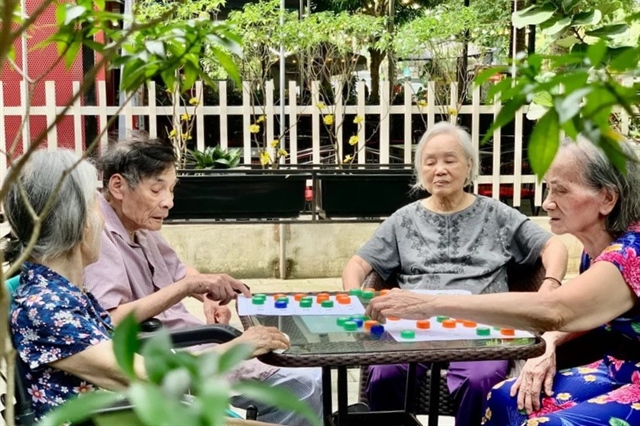 |
| Elderly people at a retirement home in Hà Nội. — VNA/VNS Photo |
HÀ NỘI — The elderly in Việt Nam traditionally spend their old age with their children, but this is changing, with the rise of retirement homes, which also presents new investment opportunities in the country.
Kim Anh, a resident in Hà Nội’s Hai Bà Trưng District, said that while living at home, her 80-year-old mother was showing signs of cognitive decline and geriatric depression, despite having a dedicated caretaker.
Learning from her friends’ experience, she decided to reach out to a retirement home.
Kim Anh was surprised at how her mother’s health has improved after moving into the facility, which her family affectionately dubbed as ‘boarding school.’
“It was not an easy decision to send her to a ‘boarding school’ because of the many social prejudices surrounding us.
“But when I see how happy and alert she is at Kaigo Nursing Centre compared to when she was back home, I realised that I cared for her in the wrong manner for so many years. Luckily, it was not too late,” said Kim Anh.
Experts say that the demand for elderly health care services is increasing in both quality and quantity as population ageing accelerates.
However, they noted that most retirement homes only respond to the needs of a small senior population living in urban areas, due to their high fees compared to the country’s average income, especially that of the elderly.
The number of senior care facilities, particularly private ones, remains modest compared to their potential.
According to data from Bảo Việt Insurance, nursing homes exist in only 32 out of the total 63 cities and provinces of Việt Nam, while the percentage of elderly people living alone is increasing.
Another survey from the Việt Nam Association of Realtors (VARS) showed that the country counts about 400 retirement homes, with about 50 per cent of them charity centres or state-invested facilities.
Việt Nam is witnessing one of the highest population ageing rates in the world, according to statistics from the United Nations Population Fund (UNFPA).
By 2036, the country is projected to enter the ageing population stage and by 2050, people aged 60 and above will account for more than 25 per cent of the national population.
This demographic change is brought about not only by a life expectancy increase and a decline in mortality rates, but also by a significant drop in birth rates.
Việt Nam’s total fertility rate has halved over the past three decades, falling from 3.8 children per woman in 1989 to below two children per woman in 2023.
VARS’ analysis says that while developed countries may have decades or hundreds of years for policy adjustments in the face of population ageing, Việt Nam has, at best, 12 years to leverage its current ‘golden population’ and respond to an incoming ageing population.
This situation presents an urgent need for retirement homes to ensure health care, treatment and quality of life for the elderly.
This demand becomes increasingly pressing with the rising number of senior citizens not living with their children in both urban and rural areas, according to VARS forecast.
Experts recommend that the government need to put forward policies that encourage business engagement in care services for the elderly population, especially in developing senior-care models.
These could be income tax reductions or exemptions in the first few years of operation, preferential loan policies or policies to attract private foreign investments, as well as state-run support funds for nursing home businesses.
A clear and transparent legal framework on the operation and standards of nursing homes is necessary, in addition to promoting public-private partnership (PPP) models in elderly care.
Troy Griffiths, deputy managing director of real estate agency Savills Việt Nam said that the Vietnamese market had multiple advantages for the development of retirement homes, with insurance packages that come with an investment value becoming particularly popular.
In the future, there should be a shift of investment opportunities from traditional family houses to nursing centres, he added. — VNS
- Reduce Hair Loss with PURA D’OR Gold Label Shampoo
- Castor Oil Has Made a “Huge” Difference With Hair and Brow Growth
- Excessive hair loss in men: Signs of illness that cannot be subjective
- Dịch Vụ SEO Website ở Los Angeles, CA: đưa trang web doanh nghiệp bạn lên top Google
- Nails Salon Sierra Madre
 VnExpress News The News Gateway of Vietnam
VnExpress News The News Gateway of Vietnam





